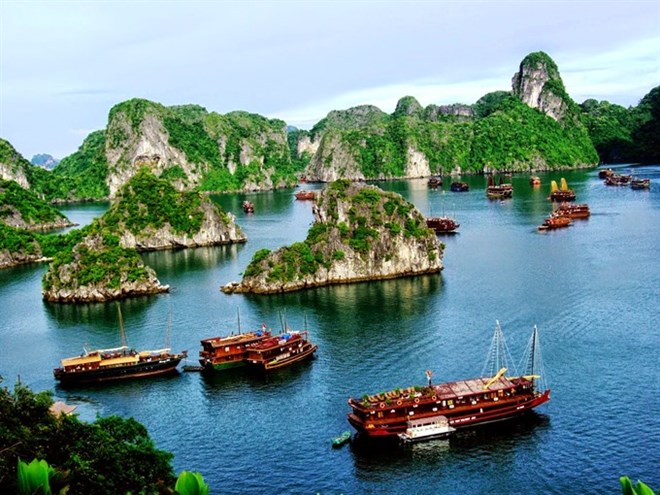
Preservation of cultural and natural heritage sites plays an important role in tourism growth in Vietnam, experts said at a conference on November 30 in HCM City.
The UNESCO-recognised world
heritage site Ha Long Bay welcomed 6.9 million visitors last year, earning
nearly 10.8 trillion VND (463 million USD) in revenue. — (Source:
chudu24h.com)
Vo Van Thanh of the Southern Institute of
Social Sciences (SISS), said thanks to tourism, protection, conservation and
restoration of world heritage sites were improved.
"In Vietnam, heritage tourism activities have contributed to introducing
the country’s World Heritage sites,” he said.
The conference, which discussed the opportunities and challenges for cultural
heritage values, was organised by the HCM City University of Culture in
collaboration with SISS, the HCM City Institute for Development Issues, and the
International Centre for the Study of the Preservation and Restoration of
Cultural Property (ICCROM).
More than 300 cultural experts and researchers from Vietnam and abroad took
part in the event.
Preservation of heritage sites has helped create jobs and improved living
standards in local communities, Thanh said.
Last year, heritage sites brought a high level of visitors and revenue from
ticket sales and tourism services, according to the Ministry of Culture, Sports
and Tourism’s Cultural Heritage Department.
Ha Long Bay in Quang Ninh province, for example, welcomed 6.93 million visitors
last year, including 2.9 million foreigners, a year-on-year increase of 12.9
million.
Its tourism revenue reached nearly 10.8 trillion VND (463 million USD), a rise
of 39 percent compared to 2016.
The Hue Citadel welcomed 3 million visitors, including 1.8 million foreigners,
earning 320 billion VND (13.7 million USD) from entrance ticket sales, a
four-time increase compared to 2011.
Nguyen Thi Thu Trang of the cultural heritage department said: "Tourism is
considered a motivating factor to protect cultural and natural heritage sites.
It is one of the most effective means for cultural exchange between Vietnam and
the world.”
Vietnam has eight UNESCO-recognised World Heritage sites and eight
UNESCO-recognised world biosphere reserves.
The World Heritage sites are the Hue Citadel, Ha Long Bay, Hoi An Ancient Town,
My Son Sanctuary, Phong Nha – Ke Bàng National Park, Thang Long Royal Citadel
complex, and Ho Dynasty Citadel.
The biosphere reserves are the Can Gio Mangrove Forest in HCM City, Nam Cat
Tien National Park in Dong Nai and Lam Dong provinces, Cat Ba Archipelago in
Hai Phong city, Hong (Red) River Delta, Kien Giang biosphere reserve in the
Mekong Delta, Cu Lao Cham in Hoi An, Western Nghe An, and Ca Mau Cape in the
southernmost province of Ca Mau.
Source:VNA
With an increasingly vibrant and widespread emulation movement aimed at building cultured residential areas and cultured families, Yen Thuy District has been making steady progress toward improving both the material and spiritual well-being of its people, while fostering a civilized, prosperous, beautiful, and progressive community.
Once lacking recreational spaces and community facilities, Residential Group 2 in Quynh Lam Ward (Hoa Binh City) has recently received attention for the construction of a new, spacious, and fully equipped cultural house. The project followed the model of state support combined with public contributions in both labor and funding.
The "All people unite to build cultural life" movement, which has been effectively integrated with Kim Boi district’s socio-economic development goals, is fostering a lively spirit of emulation across local residential areas, hamlets, villages, public agencies, and enterprises. In addition, through the initiative, traditional cultural values are being preserved and promoted, while community solidarity and mutual support in poverty reduction and economic development are being strengthened.
A working delegation of the Hoa Binh provincial People’s Committee led by its Permanent Vice Chairman Nguyen Van Toan on June 11 inspected the progress of a project to build the Mo Muong Cultural Heritage Conservation Space linked to tourism services in Hop Phong commune, Cao Phong district.
Born and growing in the heroic land of Muong Dong, Dinh Thi Kieu Dung, a resident in Bo town of Kim Boi district, in her childhood was nurtured by the sweet lullabies of her grandmother and mother. These melodies deeply imprinted on her soul, becoming an inseparable part of her love for her ethnic group's culture. For over 20 years, this love for her hometown has driven Dung to research, collect, and pass down the cultural values of the Muong people to future generations.
In the final days of May, the Ethnic Art Troupe of Hoa Binh Province organized performances to serve the people in remote, mountainous, and particularly disadvantaged areas within the province. These were not just ordinary artistic shows, but they were the meaningful journeys aimed at spreading cultural values, enhancing the spiritual life of the people and contributing to the preservation of ethnic minority cultural identities.



